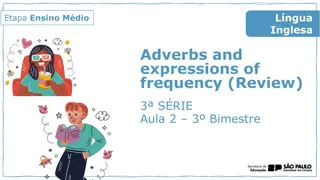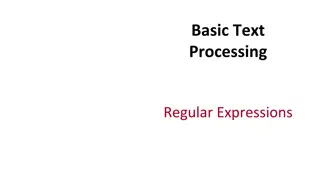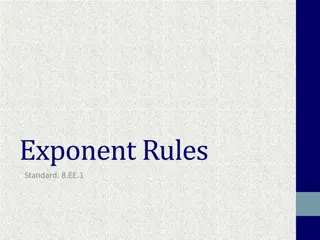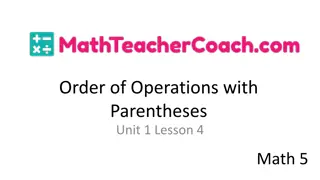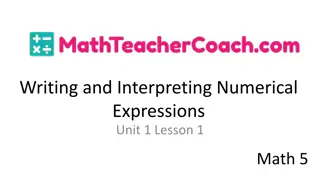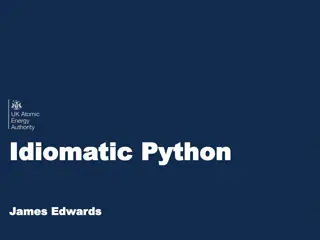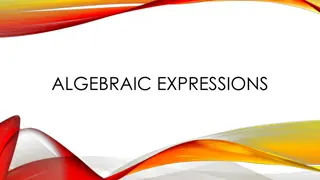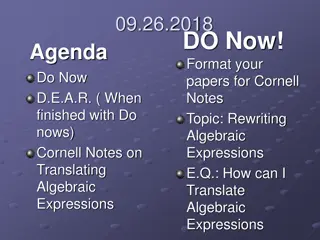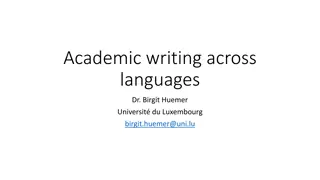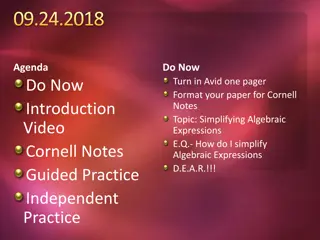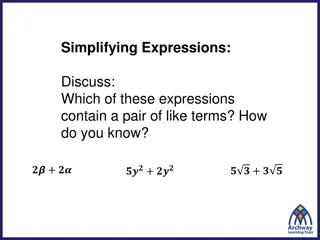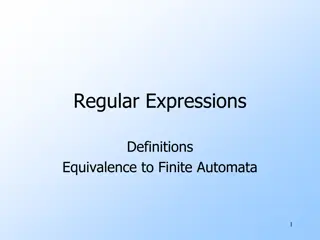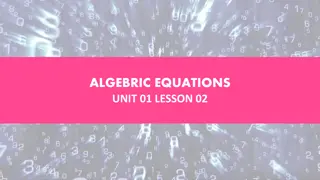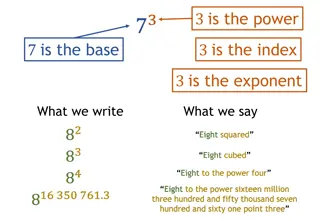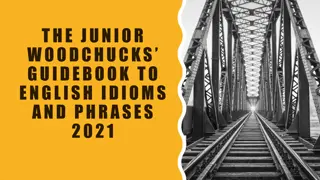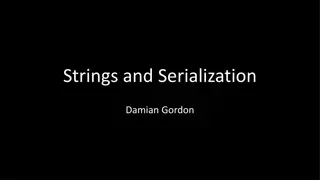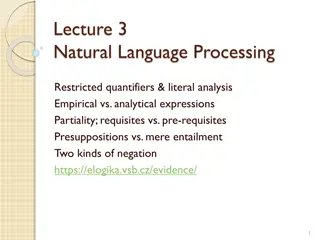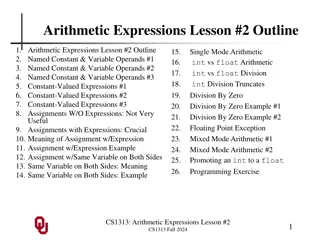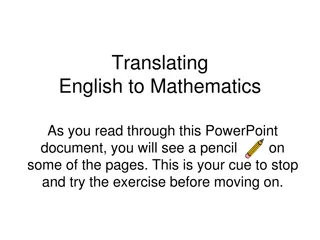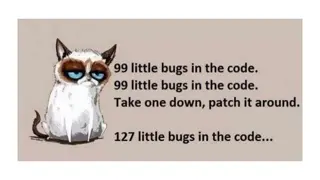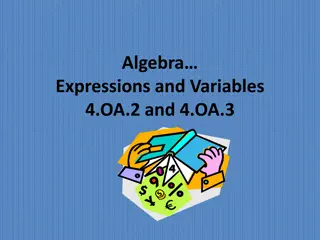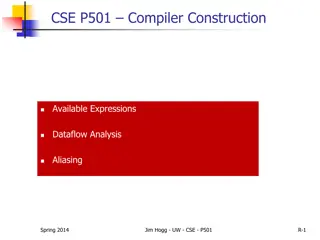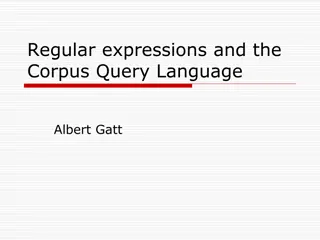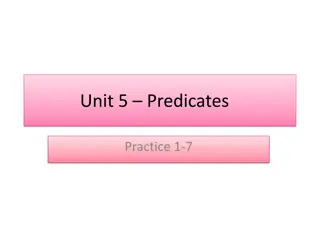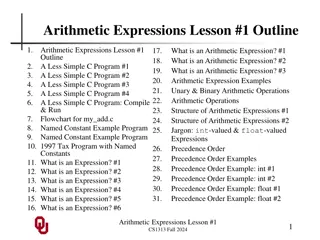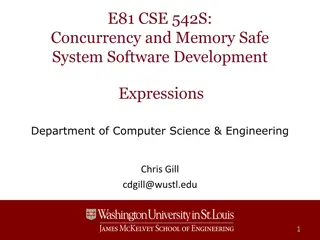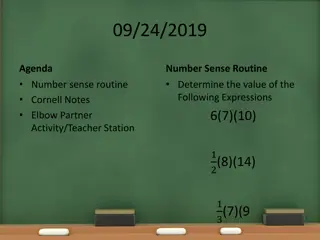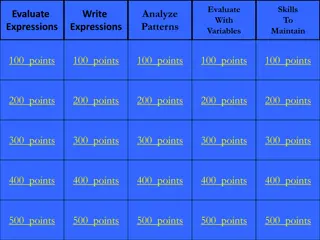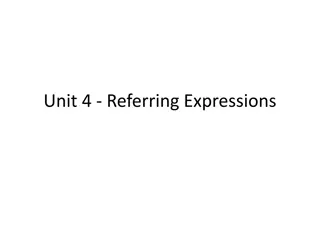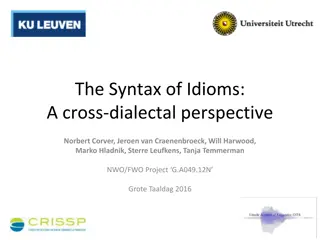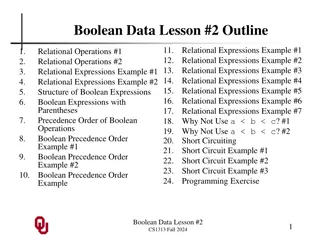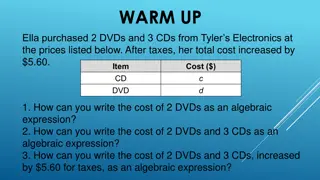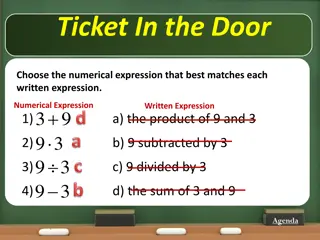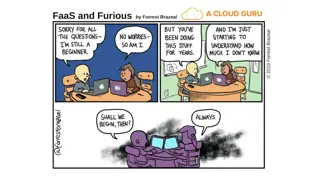Understanding Non-literal Meaning: Idioms, Metaphors, and Metonymy
The unpredictable world of non-literal meaning through idiomatic expressions, metaphors, and metonymy. Discover how these concepts shape language and thought.
3 views • 37 slides
Adverbs and Expressions of Frequency in English
Reviewing adverbs and expressions of frequency in English language for oral and written text production. Focus on types of relationships and grammar. Activities to analyze sentences and frequency indicators. Overview of common adverbs and expressions used to express regularity.
4 views • 20 slides
Understanding Regular Expressions for Text Processing
Regular expressions provide a powerful way to search for and manipulate text strings by specifying patterns. This content explores different aspects of regular expressions, including disjunctions, negations, more disjunctions, optional characters, anchors, and examples. By learning how to use regula
2 views • 46 slides
Understanding Exponents and Rules
Exponents are a shortcut for repeated multiplication. Learn how to write expressions using exponents, evaluate expressions containing exponents, and apply rules for dealing with exponents. Explore examples and see how to write expressions in exponential form, evaluate them using calculators, and sim
2 views • 32 slides
Understanding Order of Operations with Parentheses
Explore the importance of grouping symbols in numerical expressions with parentheses, brackets, and braces. Learn how to identify and evaluate expressions following the PEMDAS rule and the funnel method. Master key vocabulary and solve problems involving order of operations in mathematical expressio
1 views • 41 slides
Understanding Numerical Expressions in Mathematics
Explore the concept of numerical expressions in math, focusing on recognizing, writing, and interpreting expressions involving addition, subtraction, multiplication, and division. Learn key vocabulary and solve sample problems to enhance comprehension.
1 views • 36 slides
Understanding Mood and Modality in Morphosyntax with Prof. John Corbett
Today's session with Prof. John Corbett explores the final three sets of grammatical categories related to verbs: mood (fact or non-fact), modality (speaker's stance), and voice (subject's role). The session delves into the present-day English mood system, differentiating between various realization
1 views • 24 slides
Understanding Phrasal Verbs: Classification and Examples
Phrasal verbs are crucial in English, comprising literal, aspectual, and idiomatic categories. They consist of a verb and particle, with idiomatic ones having non-transparent meanings. Examples include "take off" and "set up," each with distinct semantic contributions emphasizing different aspects o
0 views • 9 slides
Mastering Idiomatic Python Programming Techniques
Idioms in Python, whether in natural language or programming, are expressions that simplify tasks and enhance code readability and maintainability. Using idioms in coding can also facilitate peer review. While not mandatory, learning idioms through practice, reading good source code, and self-review
0 views • 40 slides
Understanding Algebraic Expressions: Variables, Coefficients, and Constants
Explore the difference between numeric and algebraic expressions, learn about the components of algebraic expressions - variables, coefficients, and constants. Discover how to identify variables, coefficients, and constants in expressions. Classify algebraic expressions as monomials, binomials, or t
0 views • 20 slides
Mastering Algebraic Expressions: Translating Words to Equations
Learn how to translate word phrases into algebraic expressions for addition, subtraction, multiplication, and division. Understand the key phrases associated with each operation to write expressions accurately. Enhance your skills in rewriting algebraic expressions with practical examples and concis
4 views • 17 slides
Understanding Academic Writing Across Languages: Challenges and Solutions
Explore the historical development of languages in academia and science, equivalence issues, written academic genres, evolution from Latin to national academic languages, and the importance of a common language in academia. Dive into the specialized text structures, syntax, idiomatic phrases, and pr
0 views • 29 slides
Understanding Simplifying Algebraic Expressions in Pre-Algebra
Simplifying algebraic expressions involves identifying terms, like terms, coefficients, and constant terms. By combining like terms and following basic rules, expressions can be simplified to make solving equations easier for pre-algebra students.
0 views • 18 slides
Introduction to Perl Regular Expressions in SAS
Regular expressions are powerful tools for working with unstructured data in SAS, allowing you to search for specific patterns, extract substrings, and perform text substitutions using metacharacters in Perl. While writing regular expressions can be challenging at first, with practice, you can becom
1 views • 33 slides
Simplifying Expressions by Identifying Like Terms
This content discusses the concept of like terms in algebraic expressions and explains how to identify and simplify expressions by collecting like terms. It provides visual examples and prompts for practice to enhance understanding.
0 views • 27 slides
Equivalence of Regular Expressions and Finite Automata
Regular expressions are an algebraic method to describe languages, specifically the regular languages. They are defined recursively based on symbols and operations such as concatenation and closure. Precedence rules and examples are also provided. The equivalence between regular expressions and fini
0 views • 25 slides
Understanding Algebraic Expressions and Exponents
Master the basics of algebraic expressions, simplification, and exponent rules in this lesson. Learn to interpret word problems into algebraic expressions, apply properties of real numbers, and solve algebraic problems step by step. Practice evaluating expressions, simplifying equations, and underst
0 views • 13 slides
Numerical Expressions and Exponents Overview
This content covers various numerical expressions involving exponents, including examples of valid and invalid mathematical representations, matching worded expressions with their numerical equivalents, and identifying the correct expressions based on provided criteria.
0 views • 30 slides
The Junior Woodchucks' Guidebook to English Idioms and Phrases 2021
Distinguished alumni have compiled an updated treasure trove of English idioms and phrases in this guidebook. Explore the rich tapestry of expressions that make the English language so vibrant and dynamic. Enhance your language skills and delve into the nuances of common idiomatic expressions with t
0 views • 360 slides
Understanding Regular Expressions for String Manipulation
Regular expressions are powerful tools for defining search patterns in strings. They consist of basic patterns like logical OR, grouping, and quantification, as well as qualifications like zero or more occurrences. The Python Standard Library provides the 're' module for working with regular express
0 views • 32 slides
Understanding Empirical vs Analytical Expressions in Natural Language Processing
Restricted quantifiers and literal analysis in natural language processing reveal the distinctions between empirical and analytical expressions. While empirical expressions refer to non-trivial intensions that require empirical investigation, analytical expressions denote constant intensions that ca
1 views • 19 slides
Understanding Arithmetic Expressions and Constants in Programming
Learn about the importance of named constants and variables in arithmetic expressions, how to perform assignments with and without expressions, and the implications of working with integer and floating-point arithmetic in programming. Explore examples and exercises to enhance your programming skills
0 views • 26 slides
Understanding Mathematical Expressions in Algebra
Explore how to translate English phrases into mathematical expressions in algebra. Learn key phrases for addition, subtraction, multiplication, and division, and practice writing expressions for various scenarios. This presentation includes examples and guidance for mastering algebraic concepts.
0 views • 31 slides
Building interactive interpreter for Calculator Language with REPL, Parsing, and Lexical Analysis
This project involves creating a user interface similar to a Read-Eval-Print Loop (REPL) for programming languages. Users can input text representations of expressions, which are then parsed, evaluated, and errors are handled accordingly before displaying the expression's value. Additionally, the st
0 views • 22 slides
Understanding Expressions and Variables in Algebra
Learn how to find a variable in an expression and solve expressions using phrases like "three more than a number" or "nine times a number." Discover how to translate words into algebraic expressions with missing variables and avoid using certain letters.
0 views • 18 slides
Understanding Weather Expressions in Spanish Vocabulary
Learn how to use different weather expressions in Spanish, including idiomatic phrases like "Hace calor" (It's hot) and "Está nublado" (It's cloudy). Understand the nuances of expressing weather conditions in Spanish and the importance of idiomatic language. Master key phrases for talking about wea
0 views • 7 slides
Dataflow Analysis for Available Expressions in Compiler Construction
Utilizing dataflow analysis techniques, the concept of available expressions is discussed in the context of compiler construction. The goal is to identify common subexpressions that span basic blocks by calculating their availability at the beginning of each block. The process involves determining w
0 views • 59 slides
Understanding Regular Expressions and the Corpus Query Language
This content introduces regular expressions and the Corpus Query Language (CQL) developed by the Corpora and Lexicons Group at the University of Stuttgart. It explains how to use regular expressions and CQL to search for specific patterns in text, providing practical tools and examples.
0 views • 41 slides
Understanding Predicates and Referring Expressions
Explore the concepts of predicates, referring expressions, and semantic structure in simple declarative sentences. Practice identifying referring expressions and predicators to enhance your understanding of sentence meaning and structure.
0 views • 12 slides
Understanding Arithmetic Expressions in C Programming
This lesson outlines the basics of arithmetic expressions in C programming, focusing on how to perform unary and binary arithmetic operations. It covers the structure of arithmetic expressions, precedence order, and examples to illustrate these concepts. The provided C program, 'my_add,' demonstrate
0 views • 31 slides
Understanding Rust Expressions and Declarations in System Software Development
Rust is an expression language where most things have values. Learn about Rust expressions, blocks, declarations, conditional expressions, multi-case expressions, and iteration expressions in system software development. Explore the execution semantics, syntax, and best practices for writing safe an
0 views • 8 slides
Algebraic Expressions Lesson Overview
This lesson focuses on writing and reading algebraic and written expressions with grouping symbols and less than. Students will learn how to translate expressions containing groupings and less than. The lesson is designed to build on the previous day's lesson and challenge students' thinking. It set
0 views • 25 slides
Expressions and Patterns Evaluation Practice
The content focuses on evaluating expressions with variables, analyzing patterns, and maintaining mathematical skills. It includes practice exercises such as inserting parentheses to alter expression values and identifying errors in calculations. Additionally, it presents scenarios where individuals
0 views • 53 slides
The Extension Dogma: Exploring Meaning and Extensions in Linguistic Expressions
The Extension Dogma challenges the assumption that linguistic expressions inherently possess meanings. Instead, it posits that expressions have extensions without necessary meanings that determine them. Theories of meaning should focus on the extensions of expressions, while psychological studies of
0 views • 30 slides
Understanding Referring Expressions in Linguistics
Explore the concept of referring expressions in linguistics with examples, quick quizzes, and explanations. Learn about expressions with variable and constant references, differences in referents, expressions with no reference, and the definition of reference. Discover how linguistic context plays a
0 views • 10 slides
Exploring the Syntax of Idioms: A Cross-Dialectal Study
Delve into the intricacies of idiomatic expressions through a cross-dialectal perspective, examining both internal and external syntax, and criteria for identifying verbal idioms. Researchers investigate the regular syntactic rules governing idiomatic structures and their interaction with non-idioma
0 views • 46 slides
Understanding Relational Operations for Boolean Expressions
Learn about relational operations in Boolean expressions through examples and explanations. Discover how to compare numeric operands to produce Boolean results, covering equal to, not equal to, less than, less than or equal to, greater than, and greater than or equal to operations. The content inclu
0 views • 25 slides
Understanding Algebraic Expressions: Terms, Factors, and Coefficients
When dealing with algebraic expressions, it's essential to grasp terms, factors, and coefficients. Expressions consist of numbers, operations, and variables, with terms being the building blocks separated by addition or subtraction signs. Factors are the components of each term that produce the give
0 views • 13 slides
Math Expressions Exploration for Elementary Students
This content discusses numerical and algebraic expressions, teaching students how to match written expressions to numerical expressions, understand the concept of variables, and differentiate between algebraic and numerical expressions. It also covers basic operations like addition, subtraction, mul
0 views • 11 slides
Understanding Basic Python Syntax and Expressions
Python programs manipulate values using expressions and statements. Programs work by evaluating expressions that result in values. The interpreter processes expressions to display their values, while statements direct the flow of the program. Python supports different data types such as integers, fl
0 views • 46 slides

